Says Ambassador Isabel Di Carlo Quero of Venezuela at an interview with The Korea Post media
By Publisher-Chairman Lee Kyung-sik with Vice-Chairman Choe Nam-suk, Reporter Kim Soo-bin
Ambassador Isabel Di Carlo Quero of the Bolivarian Republic of Venezuela in Seoul (Charge d’Affaires a.i.) said, “My country is advancing in the diversification of the economy from the traditional sector.”
Speaking at a recent interview with The Korea Post media (publisher of 3 English and 2 Korean-language news publications since 1985), she said, “Venezuela has built five national consensuses that aim at peace and the prosperity of our Nation, and our economy is growing and is diversifying from the traditional sector into various areas.”
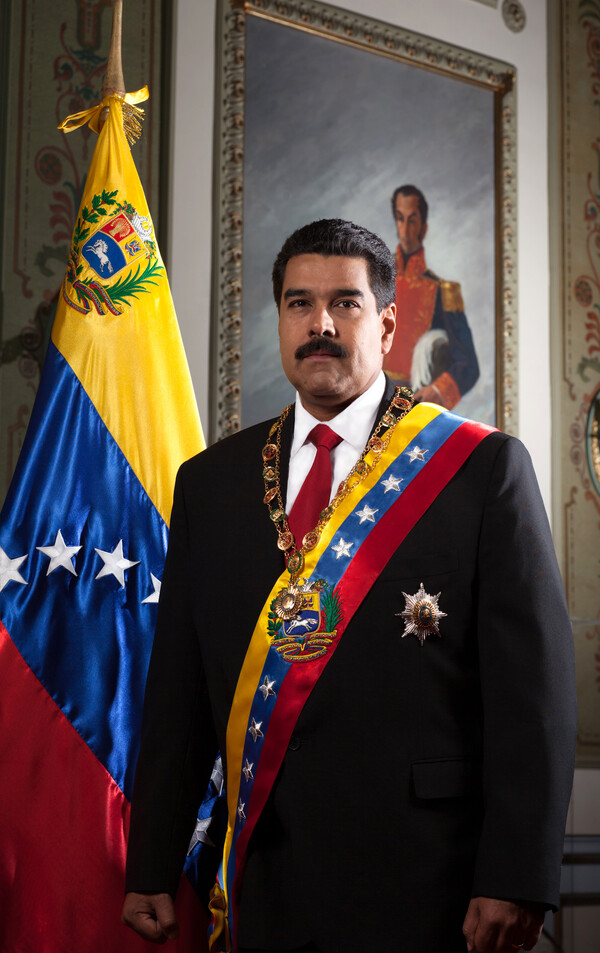
Details of the interview follows:
Question: Please introduce the latest news about Your Excellency’s esteemed country in the economic, political, cultural and other areas—interesting to Korea and the two countries.
Answer: The country is experiencing a rebirth from the difficulties we had after the devastating effects of the “Obama Decree” (Former US President signed in 2015 a Decree against the People of Venezuela), and we are advancing in the diversification of the economy. Our economy is growing and is diversifying from the traditional sector, and to secure this path, the country has built five (5) national consensuses that aim at peace and the prosperity of our Nation.
This moment helps us to remember the quantitative jump made by the Korean people in helping its economy to advance from a developing and donor-recipient country to an emerging economy leading the global markets.
The first national consensus consists in consolidating a new economic model and continuing along the path of work, national effort, recovery, growth, and economic diversification with the support of the three fundamental pillars: the private sector, the public sector, and the workers fundamental in the pursue of a model that is based in the people and not only the economical profits. Secondly, there is a national consensus on the idea of absolutely condemning the illegal and criminal sanctions, blockade and unilateral and coercive measures against Venezuela and its affectation on the human rights of our people. The third of the consensuses is to defend peace, coexistence, tolerance, and dialogue among Venezuelans, as well as reject hatred and violence.
The fourth consensus of the entire country is the need to recover the social welfare state and to recover all the social rights of the people of Venezuela, which has recently suffered injuries from illegal economic sanctions and attacks on our economy and seizure of our international goods (refineries CITGO, gold reserves and banking deposits abroad).
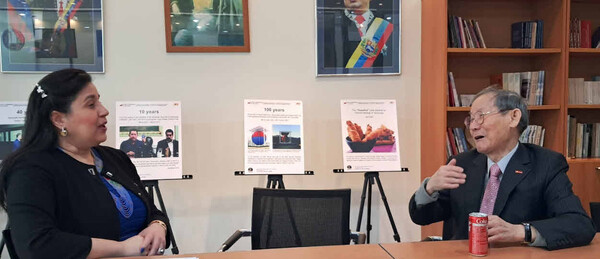
The fifth consensus refers to Venezuela's territorial controversy with Guyana over the territory of the Guayana Esequiba and the process under the Geneva Agreement, which represents 160 thousand square kilometers, almost the dimension of the Korean Peninsula.
These are the consensuses built by our President Nicolas Maduro Moros, which unite us as a Nation, and point out the direction for a New Era, in which I see there is more convergence than divergence in the interest of working together to diminish the instability in supply chains and work for the economic security.
This moment helps us to remember the quantitative jump made by the Korean people in helping its economy to advance from a developing and donor-recipient country to an emerging economy leading the global markets.
The first national consensus consists in consolidating a new economic model and continuing along the path of work, national effort, recovery, growth, and economic diversification with the support of the three fundamental pillars: the private sector, the public sector, and the workers fundamental in the pursue of a model that is based in the people and not only the economical profits. Secondly, there is a national consensus on the idea of absolutely condemning the illegal and criminal sanctions, blockade and unilateral and coercive measures against Venezuela and its affectation on the human rights of our people.
The third of the consensuses is to defend peace, coexistence, tolerance, and dialogue among Venezuelans, as well as reject hatred and violence. The fourth consensus of the entire country is the need to recover the social welfare state and to recover all the social rights of the people of Venezuela, which has recently suffered injuries from illegal economic sanctions and attacks on our economy and seizure of our international goods (refineries CITGO, gold reserves and banking deposits abroad).
The fifth consensus refers to Venezuela's territorial controversy with Guyana over the territory of the Guayana Esequiba and the process under the Geneva Agreement, which represents 160 thousand square kilometers, almost the dimension of the Korean Peninsula.
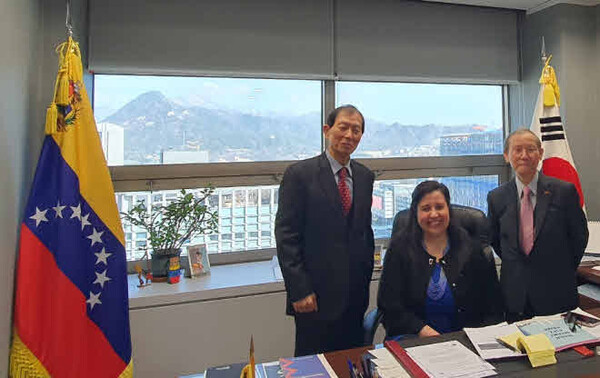
These are the consensuses built by our President Nicolas Maduro Moros, which unite us as a Nation, and point out the direction for a New Era, in which I see there is more convergence than divergence in the interest of working together to diminish the instability in supply chains and work for the economic security.
Q: Please introduce yourself to our readers to the fullest possible extent, including your family and hobbies.
A: I would like to start this interview by expressing my gratitude for the warm and friendly welcome in the Republic of Korea, which is an important gesture for the beginning of my duties as a diplomat that I appreciated very much. I would also like to thank “The Korea Post” for the interest in Venezuela and the opportunity for providing me the media to share a message with their distinguished readers.
I currently work at the Embassy of the Bolivarian Republic of Venezuela to the Republic of Korea as a Head of Mission. I started my career in the Ministry of People Power for Foreign Relations of the Bolivarian Republic of Venezuela since the year 2001.
Since then, I have exercised my responsibilities closely with our Country, the Government, the people of Venezuela, and our National Constitution (Constitution of the Bolivarian Republic of Venezuela) that was approved in 1999 through a national, open and democratic election.
The Constitution of 1999 represents a new constitutional era for Venezuela, the 5th Republic that was promoted for the vision, leadership and effort of the President Commander Hugo Chavez Frias that brought hope and opportunities to the people of Venezuela when he won the presidential elections in 1998, after the downfall of the bipartisanship and the corruption.
The aim of his campaign was to transform the State and to abolish all type of injustices, inequities and to restore the sovereignty and independence of our Nation.
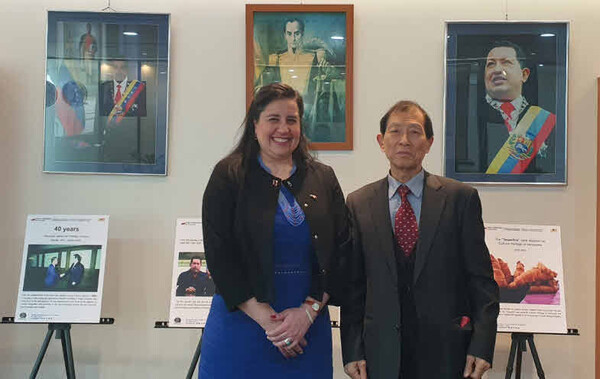
The presidential terms of President Hugo Chavez have an important meaning and historic dimension, because he brought the spirit and force of the ideas of Simon Bolivar and his transcendent goals to the present times.
He taught us that all the responses that the Venezuelan people were looking at to succeed were in the Simon Bolivar´s Doctrine, in our national heroes and also our national philosopher, his mentor, the Master Simon Rodriguez, also known by his pseudonym “Samuel Robinson”.
Nowadays, I am representing the Constitutional Government of President Nicolas Maduro Maduro, Chavez´s successor in two consecutive and democratic elected presidential periods (2013-2018 and 2018-2024).
When President Nicolas Maduro Moros used to be the Chancellor of President Hugo Chavez in the period 2006-2013, I was in charge of one of the most challenging process of an international negotiation, the “Bali Action Plan” and then the “Durban Platform” for an agreement to halt the global warming under the United Nations Framework Convention on Climate Change.
The involvement of Venezuela in this multilateral negotiation is one of the many reasons why we, the Venezuelan people felt very proud of having now as President a person that is fully responsible of the environment protection and aware of its security implication for the life in this planet, for the humanity, even so in a country with the largest oil proven reserves on earth.
Another anecdote to talk about the Government of the President Nicolas Maduro Moro, is that in his time as Chancellor and then as President of the Republic, he gave much attention to the process of peace of Colombia.
He advocated for the pacification of the country, and with that there was a close collaboration of the Government of Venezuela with our neighboring country and now they are 100% in control of its territory.
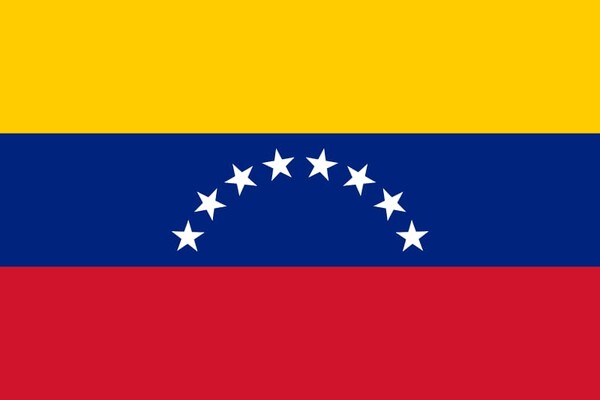
Venezuela historically has shown its commitments with the construction of a new world in which the Diplomacy of Peace prevails above the confrontation.
With this humble experience and my national commitments, I want to build as many bridges as possible, to consolidate a relationship among our countries with respect and solidarity, but also to join forces to contribute with the edification of a multicentric and pluripolar balance of powers to preserve the humankind and the resources that allow all type of the life in this planet.
In this geopolitical and multipolar balance, Korea looks at the G-7 (Group of seven), and Venezuela looks at the BRICS (Group of emerging powers), but from a bilateral perspective, I see many similarities among both countries, in spite of the distance, and the different circumstances.
For example, some similarities could be in the issues of anti-colonialism and historical reparations for the damages done during the war, oppression and slavery; the rule of law regarding international trade and the rejection of actions as measures of coercion that affect the supply chains and the economic security; the importance of the multilateralism to resolve new global challenges as the Space Law that allow countries the same rights and responsibilities with the launch of satellites; we also concur with the necessity to collectivize scientific and technological knowledge, before regulating the Artificial Intelligence, to allow all countries the same understanding of the implications and the responsibilities for its bad use; among others. We could summarize that both countries share republicans and democratic values, anti-colonial values, respect for international law, and multilateralism as a way to resolve controversies. We can achieve the relationship we want; Venezuela geographically represents going further into the Indo-Pacific influence zone and entering the Caribbean Sea and its projection to the Atlantic.
On reparations, many years ago, in 1941 Venezuela stood alone and concerned on the application of the “Black Lists”, being this an extraterritorial policy of one country that affected the economic development of our nation.
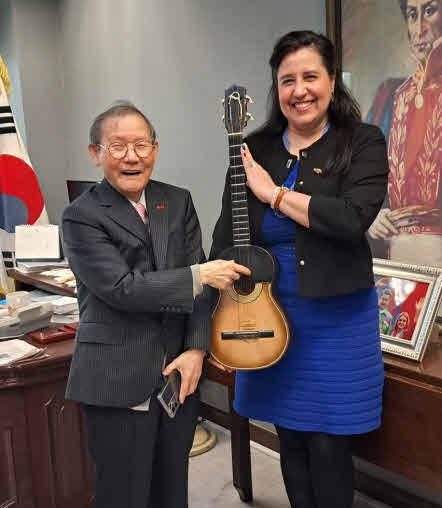
Then with the direct impact of the war on our nationals and to our country’s assets, Venezuela established its own Tribunal on Reparations of War (1947) which has been considered by various international jurists as exemplary in terms of the application of the law for responsibility of States in the event of war.
Nowadays, this fact has become one of the closest precedents for the implications of reparation for illegal sanctions. The amount of the damages is invaluable because of human life losses, but the institutions are working in the amount of the damage and also in the amount of the income not received. Calculations of the figures of the income that the Venezuelan state has stopped receiving as a result of the Unilateral and Coercive Measures in the main sector of the Venezuelan economy show a dramatic impact on the GDP of Venezuela´s national production, which has been calculated and it represents a loss of close to US$642 billion US dollars.
This amount is changing every time with new affectations to the international assets of Venezuela. This is why we are referring to it as an “economic genocide” committed against Venezuela.
Personally, think there are still too many events to learn in the history of our relations. I have had a very interesting opportunity here in Seoul to visit the “Seosomun Shrine History Museum” and found an historical document with the voting of my country in favor of the UN Resolution: “The problem of the independence of Korea”, 12th of December 1948.
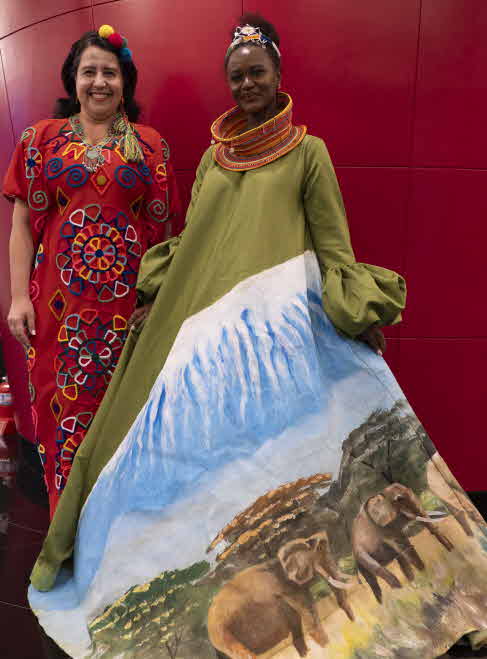
Then, I read an article that made reference to the aid of Venezuela to Korea, in 1952, under the auspices of the United Nations, with “shipments of humanitarian aid to the nascent Republic of Korea, such as textiles, footwear, food, among other, valued at more than 200.000 dollars at the time (2 million today), recognizing the efforts of the Korean people in their struggle against imperialism and colonialism, values that we share as nations”.
In between the period of time 1950-1953, it is very likely that Venezuela had been the main provider of energy of the military forces, same as it was during the 2nd World War.
This is part of the history on how Venezuela gave recognition to the Republic of Korea and then, in 1965 both countries established diplomatic relations (29/04/1965).
In 1983 Venezuela opened its Embassy in Seoul, and next year 2025 we will be having our 60° anniversary to commemorate the relation of mutual respect and collaboration in the commercial exchanges among both countries, and appreciation of our different cultural values that defines our Nations.
The President Hugo Chavez was the one and only Head of State of Venezuela that had visited the ROK-Seoul (1999), and this year marks 25° years of his meeting with President Kim Dae-jung who explained to President Hugo Chavez Frias his “Sunshine Policy” and his commitment with the peace of the Peninsula and to put an end to the Cold War in the Peninsula.
Isn’t a coincident, but many years later, in a meeting with the Commander Fidel Castro from Cuba, our President Hugo Chavez gave the name sunshine to the birth of a new political mechanism inspired by the sunrise in Spanish “ALBA” that this year will celebrate its 20th anniversary.
Finally, Venezuela and Korea have already played baseball in friendly encounters, but not yet in soccer. People from Venezuela like to dream big and our biggest wish is to qualify and compete in the soccer World Cup, so from here we can exercise the Diplomacy of Sports with a friendly match with our big hope the “Vinotinto” national soccer selection and the Korean National Team.
Q: What is the present volume of bilateral trade of your country, and its outlook in the next 12 months?
A: Since the establishment of diplomatic relations in 1965, the Republic of Korea and Venezuela have worked closely on a wide range of sectors, and the two countries have been improving their mutual understanding through economic cooperation, as well as official, cultural and educational exchanges. For Korea, Venezuela is a country with abundant resources, largest oil reserves and the ninth largest gas reserves in the world. Korean companies have increasingly sought to enter the markets of infrastructure and energy plants of the country.
In regards to the commercial relationship, it is based on the exchange of small and medium-sized companies in both countries. The value of trade exchange in 2022 was an export of Venezuela to Korea of USD 12.9 million and an import from Seoul of USD 39 million.
The Venezuelan Anti-Blockade Observatory, national institution that reports on economic policies and the productive effort to overcome illegal sanctions, explained that since the end of the year 2021, Venezuela began to grow with its own muscle and there have been ten quarters of continuous economic growth, in which the indicators of agricultural, commercial and manufacturing activity had a positive rebound for the country's growth.
I recommend to all the interested readers to review in detail the website of this institution: https://observatorio.gob.ve/ and you will see that this paths shows that Venezuela is building a new diversified economic model for the recovery of social well-being Venezuelan people and their economy that have been subjected to nine (9) consecutive years of illegal blockade, suffocating public finances, foreign trade and the oil industry.
Venezuela has developed a very meticulous legal framework to allow all foreign investors a transparent and safe environment for their business in our country, likewise the Constitutional Anti-Blockade Law (2017), the Organic Law of Special Economic Zones, and developing the Law for the promotion of Exports of the non-traditional sectors.
The lifting of some restrictions imposed by the illegal sanctions is part of the Venezuelan government’s political action in the sustained recovery of international space for our business in search of the stability of the global market, but we demand to advance with the total elimination of the sanctions in our principal industry.
Q: What are the areas in your country where your country might want Korean companies to invest and what are the areas in Korea where the businessmen of your country may wish to invest?
A: Our Government has drawn up its economic growth plan for the period 2023-2030, anchored to the 18 engines of the Bolivarian Economic Agenda, to guarantee the comprehensive development of the nation. The Head of State Nicolas Maduro Moros explained that even with social wounds, caused by the multiform war in Venezuela, the Venezuela trends is recovery and economic growth and we will continue to fight for economic and macroeconomic stability and, above all, to heal social wounds and move towards social equality at a higher stage for Venezuelan society. He maintained that these actions support the 2022-2030 economic plan, which takes into account all the fundamental variables and priorities for economic expansion and always taking care of the people.
The map of the Bolivarian Economic Agenda has allowed the country the miracle, for the growth of the real economy, the non-oil economy, even with important wounds from the economic war that we still have, even trying to strengthen and stabilize as much as possible.
The 18 Engines are:
1.- Agri-food;
2.- Pharmacist;
3.- Industrial;
4.- Exports;
5.- Communal, social and socialist economy;
6.- Hydrocarbons;
7.- Petrochemicals;
8.- Mining;
9.- National and international tourism;
10.- Construction;
11.- Forestry;
12.- Industrial military;
13.- Telecommunications and computing;
14.- Public and private banking;
15.- Basic, strategic and socialist industries;
16.- Automotive;
17.- Cryptocurrencies;
18.- Productive entrepreneurship.
In addition, five (5) Special Economic Zones (SEZs) were approved in the national territory, all of them in the north part of the country with access to maritime ports and international airports, and also with a great touristic potential:
City of Paraguaná (Falcón state),
City of Puerto Cabello – Morón (Carabobo state),
City of La Guaira (La Guaira state),
Margarita Island (Nueva Esparta state) y
Isla La Tortuga (Turtle Island) (Territorio Insular Miranda).
The SEZs are defined as a “geographical delimitation that has a special and extraordinary socioeconomic regime, in whose polygonal the strategic economic activities provided for in its Law are carried out, in accordance with the objectives established in the Economic and Social Development Plan of the Nation.” Among its fundamental purposes are the development of a new national productive model; which seeks to diversify and increase exports, innovate processes in order to promote productive chains and international markets; as well as strengthening the industrial apparatus and promoting selective import substitution. (Organic Law of Special Economic Zones (LOZEE)
Q: What are your competitive products and/or services attractive to Korea?
A: Venezuela is betting for the diversification of the economy from the traditional sector (energy) and is calling for the promotion of exports of the nontraditional sector, and that imply go back to our historical productive roots and incorporating the flourishing new entrepreneurships.
Venezuela used to be the largest producers of Cocoa and Coffee beans in the world in the 18th century, but with the appearance of the oil in the 19th century the dynamics in the production had a transcendental change.
Without bragging, Venezuela has the biggest certified reserves of barrels of oil and the largest oil reserve on the planet, and also the same reference in natural gas. Similar in mining, Venezuela has impressive number in certified reserves in gold, diamond, iron, bauxite, coltan, among others. The main national companies are “Petróleos de Venezuela S.A” (PDVSA), and the “Corporación Venezolana de Guayana” (CVG).
The new windows of opportunities to invest and to promote the diversification for exports of the “no traditional” refers to the following sectors, those one recognizes as the 18 engines for the diversification of the economy that we mention above.
Q: Korean people, especially the up-and-coming Korean businessmen need rest and recuperation. What are your tourist attractions?
A: We used to call Venezuela: one country with multiple destinations because of its different options.
The geographical location of my country is in the North of South America, with more than 3 thousand kilometers of cost in the Caribbean Sea and paradisiacal islands in the Caribbean Sea (72), but also a facade to the Atlantic Ocean; the Andean Mountain part of the famous mountain chain in South America “Los Andes”; the most impressive geological formation from the Precambric Era the “Tepuyes” in the National Park Canaima and the largest waterfall on earth called “Angel Waterfalls”; the tropical rainforest in the Amazonas state; and the plains of Venezuela, and immense and diverse flora and fauna.
The beauty of the biodiversity in Venezuela makes the country a destination of observation of birds, the different turtle’s types and so on, throughout a policy of protected area of more than 43 National Parks and Natural Monuments. Venezuela has the number of six hundred and forty-six (646) cultural assets declared national monuments and assets of cultural interest throughout the country. And the final touch, is the richest and diverse culinary gastronomy different from one part to another in the country.
On the official website of the Ministry for Tourism, you will find detailed information: https://www.mintur.gob.ve/View/inicio.php, and also there is an important platform called “FitVen”, the Venezuelan International Tourism Fair.
Q: What are the most important festive days in your country? Please elaborate.
A: The people of Venezuela are very hardworking, and for that they value very much the free time and holidays to spend with relatives in different kind of relaxing activities, and for that reason when a day off appear in the calendar is the perfect excuse to adequate the agenda for a long weekend.
14th January Divina Pastora procession (2nd largest Marian procession in Latin America)
February Carnival (two days off)
Easter (two days off)
13th of March passing of the Eternal Commander Hugo Chavez Frías
1st of May Labor Day
19th of April is the Declaration of Independence Day (1810)
24th of June the Carabobo’s Battle (1821)
5th of July is the Independence Day (1811)
24th of July Birth of The Liberator Simón Bolívar (1783)
17th of December passing of The Liberator Simón Bolívar (1830)
24 to 25 Christmas
31 to 1st New Year
Q: Do you have Honorary Consul(s) in Korea? If yes, how are they contributing to the promotion of cooperation and friendship between the two countries?
A: We don’t have an Honorary Consul in Korea, but we have is a Consular Section in the Embassy in Seoul that is responsible to attend all the consular jurisdiction of the Republic of Korea. Last year 2023 we commemorate the forty (40) years of the opening of our Embassy here in Seoul 1983-2023, and I think it was an important step after the establishment of the bilateral relation among both countries in 1965. The Consular Section not only attends the conational, but also people from Korea that wish to travel to Venezuela for multiple purposes, vacations or business.
Nowadays, with the speed of communications and the social networks I consider some Korean influencers the new version of an Honorary Consul. They travel to Venezuela and experience different cities and the historical and touristic places and the culinary gastronomy and they promote our beauties with a very positive and cheerful tone.
Another reason we don’t have an honorary consul is because the citizens from Korea are exempted from issuing a visa to travel to Venezuela for touristic purposes, and the people that may need visa are attended in the Consular Section in Seoul. With the modernity, and the use of the social networks, the country is becoming very popular and the people share their experience in these platforms and have caused a new bloom for the touristic sector, for example the sky surfing in “Los Roques” or the highest waterfall in the world the “Angel Fall” in the National Park Canaima. The other benefit of modernity is that now we have different options to fly to Venezuela with only one stop, and in my opinion one of the best options, because of the frequency, is Seoul-Istanbul-Caracas.
Q: Who among the Koreans are considered to be most prominently contributing to the promotion of relations, cooperation and friendship between the two countries? We would like to introduce them adequately so that others could follow their suit.
A: Let me say this is a difficult question; I think the Korean people who travel to Venezuela or are related somehow to Venezuelans. We also like to hear and know stories from the people of Korea that travel to Venezuela and they stayed “in love” with the experience, sometimes even nostalgic, people that go for business trip too, in general all the stories heard so far are good and positives and are an important remark for the promotion and diversification of our bilateral relation.
On the other hand, I believe Korea has a super power with the K-Culture issue that fascinate many in the distance including (food, music, dance, taekwondo, soccer). We share the same fine tastes for the arts, and both believe in its power to invigorate our societies through inclusion, and the best experience together we have is: El Sistema of social action through music with the foundation of orchestras.
Promoting the opportunity to learn to play a musical instrument is the most revolutionary thing we can do, not only as a tool of social inclusion and social transformation, but also for world peace.
And, of course, MOFA is the official interaction among states and the first window for a positive and productive interaction. We diplomats are very serious about respecting the channels for the maintenance of a positive and good relationship. Korea has a diplomatic representation in Caracas that promotes friendship, cultural exchanges, and investments among our countries, and Venezuela one representation in Seoul.
Q: Please add whatever other details that Your Excellency might consider to be important.
A: Last year, Venezuela held an historic electoral event that took place on December 3rd, 2023. It was the Consultative Referendum in defense of the Essequibo territory.
Since the year 1999 in Venezuela began an historical stage known as the 5th Republic, which has to do with the foundation of the democratic values and principles that the Venezuelan people approved, through a referendum, that gave birth to the current Constitution of the Bolivarian Republic of Venezuela (CRBV), and which are based on the Doctrine of Simón Bolívar, The Liberator. Our model of democracy is no longer strictly “representative” as it was in the 4th Republic within the framework of the Constitution of 1961, and we moved to a participatory and leading democracy with mechanisms of direct democracy through consultations or referendum.
This is how it is established that: “All citizens have the right to participate freely in public affairs, directly or through their elected representatives. The participation of the people in the formation, execution and control of public management is the necessary means to achieve the role that guarantees their complete development, both individually and collectively.
It is the obligation of the State and the duty of society to facilitate the generation of the most favorable conditions for its practice.” (CRBV, Article 62°).
To carry out these forms of popular participation, at the constitutional level the mechanisms were contemplated to enforce political rights, which are the following: “They are means of participation and protagonism of the people in the exercise of their sovereignty, in the political sphere: the election of public offices, the referendum, the popular consultation, the revocation of the mandate, the legislative, constitutional and constituent initiatives, the open town hall and the assembly of citizens whose decisions will be binding, among others (…)” (CRBV, Article 70°).
To date, and within the framework of the current Constitution (CRBV, 1999), six (6) historic referendums have taken place in the period 1999-2023: two in 1999; 2004; 2007; 2009 and 2023.
Within the framework of this constitutional principle of participatory and leading democracy, the National Assembly had the initiative to call the Consultative Referendum in defense of the Essequibo territory, and to do so it provided 5 key questions of this historical process, therefore it is incorrect to consider this matter as an “emerging” issue for political purposes for the benefit of some particular actors or political bias, as it is an issue about the vital interests of the Homeland and national unity that has been systematically addressed since the approval of the CRBV of 1999, which exhaustively established that: “The territory and other geographical spaces of the Republic are those that corresponded to the Captaincy General of Venezuela before the political transformation that began on April 19, 1810, with the modifications resulting from the non-vitiated treaties and arbitration awards of nullity.” (CRBV, Article 10°)
Framed in this legal mandate, in addition there was a constitutional protection: “Ruling of the Constitutional Chamber of the Supreme Court of Justice that orders the National Electoral Council to continue, within the framework of its powers, with the necessary procedures to guarantee the right to political participation of Venezuelan citizens, for the purposes of carrying out the consultative referendum scheduled for December 3, 2023", which can be consulted electronically at: http://historico.tsj.gob.ve/decisiones/scon /noviembre/330131-1470-161123-2023-23-1150.HTML, the Consultative Referendum in defense of the Essequibo territory was held on December 3, 2023.
This electoral event had the participation of 10,555,092 voters from a total of 21,027,120 voters registered in the Venezuelan Electoral Registry, which represents a participation of 51.01% (Official information that can be reviewed at (http://www.cne.gob.ve/web/gacetas_electorales/gacetas/2023 /gaceta_electoral_1037.pdf).
It is very pertinent and important to note that there was a familiarization process with this process on Sunday, November 19, 2023, which is known as the Electoral Simulation that tripled the number of votes of any simulation carried out in Venezuela, which allowed speed in the voting process.
There was also a massive process of adhesion which, as of November 15, 2023, had 786,321 political, social and institutional organizations of Venezuelan society (Can be consulted at: http://www.cne.gob.ve/web/sala_prensa/noticia_detallada.php?id= 4235).
The electoral authority in Venezuela is the National Electoral Council (CNE), and for this opportunity it considered only the vote in the country, unlike the presidential elections, when the CNE organizes the vote abroad through the Diplomatic Missions and Consulates of the Republic abroad, and in addition to this provides for the figure of International Electoral Accompaniment and Electoral Missions.
The Venezuelan population is an estimated 33,728,624 million Venezuelans (Projected population, Census 2011), but the electoral registry is 21,027,120 people capable of voting: 20,801,620 are Venezuelans, and 225,500 are foreigners, registered in the Venezuelan Electoral Registry and capable of voting (over 18 years of age). Therefore, a little bit more than 50% of the population registered in the Electoral Registry participated, a number of voters (10,555,092), until now, unprecedented in the electoral processes that have taken place in the country since 1999.
The referendum was around five (5) questions that constitute the margin of action in defense of the Essequibo territory of Venezuela, and has been established as the 6th.
Historical stage of the territorial controversy over approximately 160 thousand square kilometers of continental territory that generates a maritime space towards the Atlantic façade of Venezuela, and that has been defended by an historically sustained state policy and in unrestricted adherence to International Law, and must be seen in the Article 1° of the Geneva Agreement (1966): “A Mixed Commission is established with the task of seeking satisfactory solutions for the practical settlement of the controversy between Venezuela and the United Kingdom arising as a consequence of the Venezuelan contention that the Arbitration award of 1899 on the border between Venezuela and British Guiana is null and void.”
That is why, on the official map of Venezuela, the Essequibo was shown as a Reclamation Zone subject to a special condition within the framework of the 1966 Geneva Agreement, reasons that explain why it is incorrect to speak of “annexation.”
Another important element to highlight is that the result of the Consultative Referendum ratifies the historical and unequivocal position of Venezuela with respect to the International Court of Justice (ICJ) of the United Nations, regarding the mandatory jurisdiction of the ICJ to resolve the territorial controversy over the Essequibo.
Venezuela is part of the group of countries (119) that do not recognize the mandatory jurisdiction of the International Court of Justice, among which are Guyana and the United States. For the Venezuelan State, and with the popular support of the referendum of December 3, 2023, the ICJ does not have jurisdiction or competence to hear about the territorial controversy of Guayana Esequiba with the Cooperative Republic of Guyana, since the only legal instrument, valid and current, is the Geneva Agreement of 1966.
The electoral result of Sunday, December 3, 2023 (https://www2.cne.gob.ve/rc2023) validated the historical position of the Republic in the defense of the Essequibo territory and approved a line of action for what has been considered the 6th Stage of the claim of our Guyana Esequiba, over which Venezuela has historical documentation that supports its ownership, and as has been indicated by our President of the Republic, Nicolás Maduro Moros: “if something characterizes our history, it is that our independence was not granted by anyone, we conquered our independence with blood, sweat, fire, tears and sacrifice” for this reason the nation sentiments in defense of our territory are incontrovertible.
The correct reading of this electoral event is that it was an overwhelming and unquestionable victory of the YES in support of the defense of the historical and inalienable rights of Venezuela over the Essequibo territory.
From this democratic event, the patriotism of the Venezuelan people stands out by reaffirming their will with respect to this historical dispute, above the partisan political dynamics, and the vindication of the pacifist character of Venezuela, rejecting the interference of extra-regional actors and interests and the use of the military threat, and in general, is a strong support for the line that the National Executive has followed with respect to the defense of our Essequibo territory. For this, we proclaim that Venezuela’s sun rises on the Essequibo!

